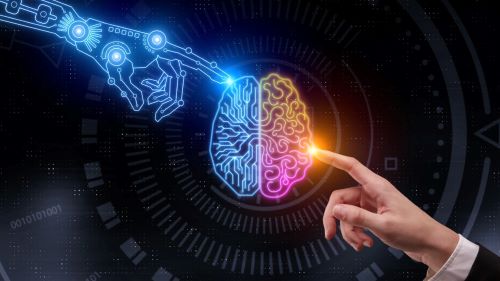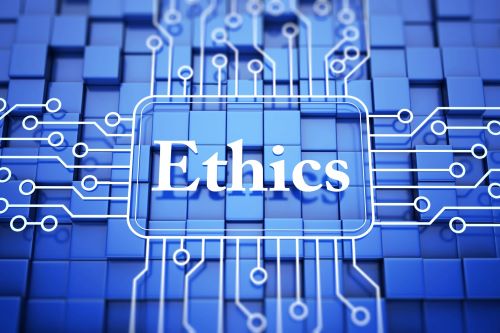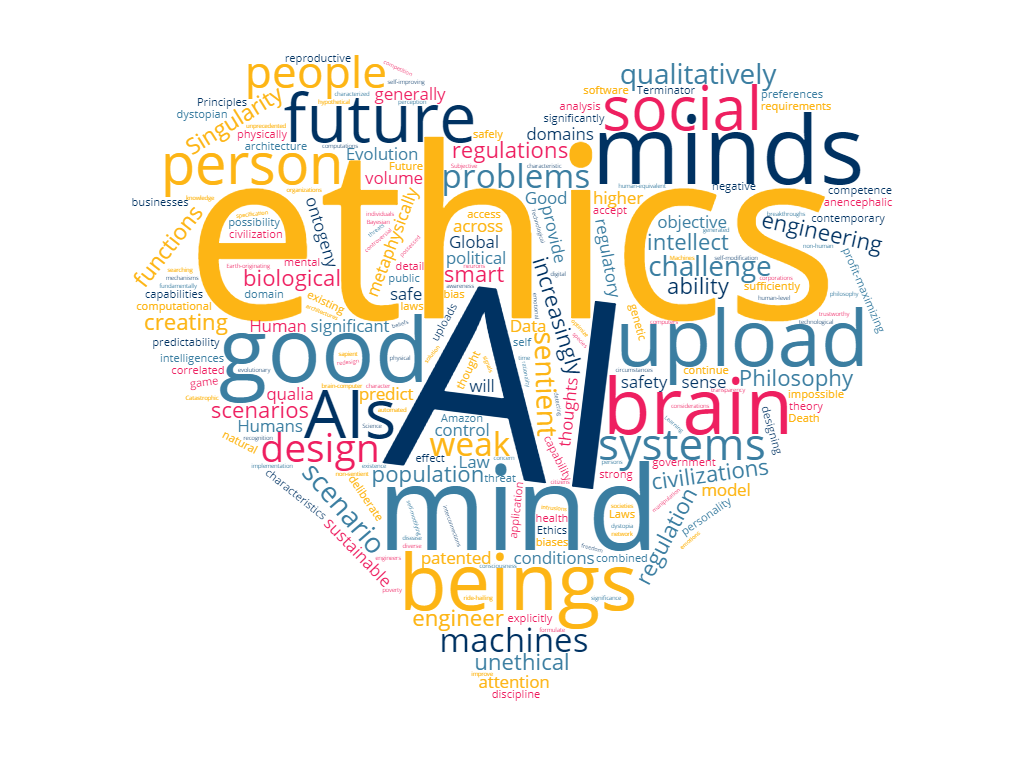The Significance of Ethical AI: Making certain Equity and Bias Mitigation
Synthetic intelligence (AI) has unquestionably solidified its position as a transformative drive, permeating varied aspects of our lives. As we witness this profound technological shift, the moral dimensions inside the realm of AI have turn into extra vital than ever earlier than. On this article, we embark on a journey to discover the profound significance of ethics in AI, unveiling methods which are pivotal in guaranteeing equity and mitigating bias in these clever methods.
Anúncios

Understanding Synthetic Intelligence (AI)
Defining AI and Its Evolution Synthetic Intelligence, typically abbreviated as AI, represents the fusion of pc science, arithmetic, and cognitive science. It encompasses the event of algorithms and methods that may carry out duties which, historically, required human intelligence. The evolution of AI has been awe-inspiring, transitioning from rule-based methods to the period of machine studying and the deep neural networks we see at present.
On a regular basis Functions of AI AI has transcended the realm of science fiction, infiltrating our each day lives in methods we would not even discover. From the digital assistants on our smartphones like Siri and Google Assistant to the subtle suggestion methods on e-commerce web sites, AI has seamlessly built-in into our routines, simplifying duties and enhancing our experiences.
The Fast Development of AI Expertise The tempo at which AI know-how is advancing is nothing wanting exceptional. With breakthroughs in pure language processing, pc imaginative and prescient, and reinforcement studying, the boundaries of what we thought AI might obtain are frequently being pushed. This fast evolution has opened up a realm of prospects, but it surely has additionally ushered in a brand new set of moral concerns.
The Moral Problem in Synthetic Intelligence

Anúncios
The Ethics Dilemma in AI On the coronary heart of AI’s moral problem lies a profound dilemma: How can we instill machines with moral rules once they lack consciousness? Hanging this stability is a formidable job that calls for a fragile interaction of know-how, philosophy, and society’s values. It includes imbuing AI methods with a way of ethical judgment and accountability, one thing historically related to human beings.
Bias and Prejudice in AI Techniques Probably the most urgent moral considerations in AI revolves round bias. AI methods, that are designed to make selections primarily based on patterns in information, can inadvertently perpetuate and even amplify societal biases. This will result in unequal remedy or discrimination in opposition to sure people or teams.
Potential Dangers of Unethical AI The dangers related to unethical AI are multifaceted. Unethical AI may end up in biased decision-making, privateness infringements, and unintended penalties. Within the worst-case state of affairs, it might undermine public belief in AI applied sciences, hindering their acceptance and adoption.
Anúncios
Justice and Fairness in AI
The Want for Justice in AI Justice in AI signifies the equitable distribution of advantages and burdens related to AI methods throughout society. It includes addressing historic inequalities and guaranteeing that AI serves the higher good with out disproportionately benefiting particular teams.
Realizing the Advantages of Fairness in AI Equitable AI has the potential to unlock untapped human potential and innovation, fostering a extra inclusive and affluent society. It implies that the advantages of AI will not be restricted to a privileged few however are accessible to all.
Moral Concerns in AI Choice-Making The choices AI methods make have far-reaching penalties. Making certain that these selections align with moral rules is crucial for constructing belief and accountability in AI applied sciences. It includes defining moral boundaries and embedding them into the algorithms and methods that drive AI.
Within the subsequent part, we’ll delve deeper into the intricacies of bias in AI, exploring what it’s, the place it comes from, and the way it impacts totally different person teams.
Unpacking Bias in AI

What Is Bias in AI? Bias within the context of AI refers back to the presence of systematic and unfair distinctions within the outcomes produced by AI algorithms. These distinctions can manifest in varied kinds, corresponding to favoring one group over one other, misclassifying information, or making selections that mirror societal stereotypes.
Widespread Sources of Bias in AI Bias in AI can stem from a number of sources alongside the AI improvement pipeline. It could actually originate within the information used to coach AI fashions, be launched throughout algorithm design, or emerge on account of the interactions between AI methods and their atmosphere. Human biases can even inadvertently discover their means into AI methods throughout information assortment and annotation.
Affect of Bias on Completely different Consumer Teams Bias in AI just isn’t a one-size-fits-all downside. Its penalties fluctuate primarily based on the particular context and the person teams concerned. For example, bias in credit score scoring fashions can result in unequal entry to monetary companies, whereas bias in hiring algorithms can perpetuate gender or racial disparities within the job market. Recognizing these distinctions is essential in addressing bias successfully.
The Societal Affect of Bias in AI

Penalties of Bias in AI The repercussions of bias in AI will be far-reaching. Biased AI methods can result in unfair lending practices, discriminatory hiring selections, and discriminatory pricing, amongst different points. These penalties contact each side of society, from training and healthcare to felony justice and finance.
Algorithmic Discrimination Algorithmic discrimination happens when AI methods make selections that discriminate in opposition to people primarily based on components like race, gender, or socioeconomic standing. This type of discrimination will be insidious, because it typically happens covertly inside the black field of AI algorithms.
Gender and Racial Bias in AI Techniques There have been quite a few cases the place AI methods have exhibited gender or racial bias, inflicting public outcry and highlighting the urgent want for bias mitigation. These biases can reinforce stereotypes and exacerbate current inequalities.
Understanding the multifaceted nature of bias in AI is crucial for crafting efficient methods to mitigate it. Within the subsequent sections, we are going to discover the moral requirements that information AI improvement, strategies to mitigate bias, and the significance of transparency and explainability in guaranteeing moral AI practices.
Moral Requirements in Synthetic Intelligence
Moral Ideas in AI Growth To navigate the moral challenges posed by AI, it is essential to determine clear moral rules for its improvement. These rules typically embody ideas like equity, accountability, transparency, and privateness. By adhering to those rules, builders can make sure that AI methods align with societal values and norms.
Worldwide Requirements and Tips The worldwide neighborhood acknowledges the necessity for moral requirements in AI. Organizations just like the IEEE, the European Fee, and the Partnership on AI have proposed tips and rules for moral AI improvement. These worldwide requirements intention to foster a shared understanding of moral practices within the world AI neighborhood.
The Position of Regulatory Our bodies Regulatory our bodies play a pivotal position in implementing moral requirements and holding AI builders accountable for his or her creations. Laws such because the Normal Information Safety Regulation (GDPR) and the rising AI Act within the European Union emphasizes the significance of moral AI practices, imposing penalties for non-compliance.
Strategies for Bias Mitigation in AI
Gathering and Utilizing Unbiased Information The muse of moral AI lies within the high quality of information used for coaching. Gathering and utilizing unbiased information is paramount in stopping the introduction of bias into AI methods. This includes cautious information choice and curation, with an emphasis on representing numerous views and avoiding information that displays societal biases.
Creating Truthful Algorithms AI builders should prioritize equity in algorithm design. This implies contemplating the potential biases in information and algorithmic selections and actively taking steps to mitigate them. Strategies like re-sampling, re-weighting, and adversarial coaching will be employed to attain equity in AI fashions.
Auditing AI Fashions for Bias Common audits of AI fashions are important to establish and rectify bias in deployed methods. These audits contain assessing mannequin efficiency throughout totally different demographic teams and utilizing metrics like disparate affect and equal alternative to quantify and mitigate bias.
Transparency and Explainability in AI

The Significance of Transparency Transparency in AI refers to creating the inside workings of algorithms and decision-making processes comprehensible and scrutinizable. Clear AI methods permit customers to realize perception into how selections are made, which is important for accountability and belief.
Making AI Fashions Explainable Explainable AI (XAI) is a burgeoning area that focuses on growing AI fashions that may present comprehensible explanations for his or her selections. This not solely helps customers perceive why AI methods make particular decisions but additionally assists builders in figuring out and rectifying bias or moral considerations.
Regulatory Frameworks for AI Transparency Governments and regulatory our bodies are recognizing the significance of transparency in AI. They’re starting to determine frameworks that require organizations to supply explanations for his or her AI selections, significantly in high-stakes purposes like finance and healthcare.
As we transfer ahead, the article will delve into moral decision-making in AI, the crucial of educating ethics in AI training, and supply real-world case research that illustrate each the successes and failures of moral AI practices. These sections will additional underscore the vital position of ethics within the AI panorama.
Moral Choice-Making in AI
Moral Concerns in Autonomous Choice-Making AI methods are more and more making selections autonomously, from self-driving vehicles navigating metropolis streets to healthcare AI aiding in prognosis. Making certain that these selections align with moral rules is paramount. Builders should program AI to make selections that prioritize human well-being, security, and equity, particularly in eventualities the place human intervention is probably not doable.
Accountability and Accountability in AI Techniques Figuring out who’s accountable for AI outcomes is a vital moral concern. This extends past the builders to organizations that deploy AI methods and the regulatory our bodies that oversee them. Clear strains of accountability should be established to make sure that adversarial AI selections will be traced again to accountable events, facilitating accountability and redress.
Selling Moral Choice-Making in AI Selling moral decision-making in AI improvement and deployment requires a multifaceted method. This contains training and consciousness campaigns, fostering a tradition of ethics inside tech corporations, and incorporating moral concerns into AI design and implementation processes. By addressing these features, the AI neighborhood can try for accountable and moral AI practices.
Educating Ethics in AI

The Significance of Ethics Schooling for AI Professionals Incorporating ethics into AI training is crucial for equipping future professionals with the data and instruments to navigate moral challenges. Ethics training empowers AI practitioners to acknowledge, assess, and handle moral dilemmas successfully.
Curricula for Moral AI Schooling Moral AI training ought to embody a broad spectrum of subjects, together with bias mitigation, transparency, accountability, and the societal implications of AI. Curricula ought to be designed to encourage vital considering and moral decision-making in AI improvement and deployment.
Fostering Ethics within the Tech Business Tech corporations play a pivotal position in fostering moral AI practices. They’ll create organizational cultures that prioritize ethics, from the design and improvement phases to the deployment and monitoring of AI methods. By embedding moral concerns into their company DNA, tech corporations can set a optimistic instance for the trade.
Case Research: Successes and Failures in Moral AI
Examples of Firms Prioritizing Moral AI A number of forward-thinking corporations have made moral AI a cornerstone of their improvement practices. For example, Google’s AI Ideas prioritize equity, accountability, and transparency, whereas IBM’s AI Equity 360 toolkit offers builders with instruments to establish and mitigate bias.
Cases of Moral Failures in AI and Their Penalties In distinction, cases of moral lapses in AI have resulted in public backlash, regulatory scrutiny, and monetary repercussions. These circumstances function cautionary tales, highlighting the significance of strong moral AI practices.
Future Challenges in Moral AI
The Ever-Evolving Panorama of AI Expertise As AI know-how continues to evolve, new moral challenges will inevitably emerge. The panorama of AI is dynamic, with rising applied sciences like quantum computing, autonomous weapons, and deepfakes presenting novel moral dilemmas that demand ongoing adaptation and vigilance.
Rising Moral Challenges in AI Rising applied sciences deliver forth distinctive moral challenges. Autonomous weapons elevate questions in regards to the ethics of deadly AI, whereas deepfakes problem our understanding of fact and actuality. As AI continues to intersect with fields like healthcare, finance, and training, it should introduce new complexities that require moral scrutiny.
Methods for Addressing Future Moral Challenges To deal with future moral challenges in AI, proactive measures are important. Collaboration amongst stakeholders, together with AI builders, regulators, ethicists, and the general public, is essential. A dedication to moral rules, coupled with the power to adapt to evolving know-how, might be key in shaping the moral panorama of AI.
Conclusion
Recapping the Essential Position of Ethics in AI Moral concerns will not be a mere addendum however an intrinsic part of AI improvement. They underpin the accountable use of AI and form its societal affect.
The Ongoing Dedication to Equity and Bias Mitigation Mitigating bias and guaranteeing equity in AI is an ongoing dedication. It requires vigilance, accountability, and a steady dedication to moral rules.
Shaping the Way forward for Moral AI and Its Affect on Society The way forward for AI holds large potential for optimistic societal change. By prioritizing ethics, we are able to pave the best way for AI methods that mirror our values, promote fairness, and contribute to a greater world.
Continuously Requested Questions (FAQ) about Moral AI
What’s Moral AI, and why is it vital?
Moral AI refers back to the improvement and use of synthetic intelligence methods in a way that aligns with moral rules, equity, transparency, and accountability. It is essential to make sure AI methods respect human values, keep away from bias, and make accountable selections to stop hurt.
What’s bias in AI, and why is it a priority?
Bias in AI refers to systematic and unfair distinctions in outcomes produced by AI algorithms. It is a concern as a result of biased AI can result in discriminatory decision-making, unequal remedy, and reinforce societal prejudices.
How can bias in AI be mitigated?
Bias mitigation includes varied methods, together with accumulating unbiased information, designing honest algorithms, and auditing AI fashions for bias frequently. Transparency and explainability in AI additionally play a big position in bias mitigation.
What are some moral rules in AI improvement?
Moral rules in AI improvement embody equity, accountability, transparency, privateness, and non-discrimination. These rules information the creation of AI methods that respect human values and societal norms.
How can AI decision-making be made extra moral?
Moral decision-making in AI includes programming methods to prioritize human well-being, security, and equity. It additionally requires establishing clear strains of accountability and accountability for AI outcomes.
Is there a necessity for ethics training in AI?
Sure, ethics training is crucial for AI professionals. It equips them with the data and instruments to navigate moral challenges in AI improvement and deployment.
Are you able to present examples of corporations prioritizing moral AI?
Firms like Google, IBM, and Microsoft have established moral AI rules and instruments to handle bias and promote equity in AI methods. They function examples of organizations prioritizing moral AI practices.
What are some rising moral challenges in AI?
Rising applied sciences like quantum computing, autonomous weapons, and deepfakes current new moral challenges. Moreover, as AI intersects with varied fields, it introduces novel complexities that require moral scrutiny.
How can people contribute to moral AI practices?
People can contribute by advocating for moral AI, staying knowledgeable about AI developments, and supporting organizations and insurance policies that promote accountable AI practices.
What’s the way forward for moral AI?
The way forward for moral AI lies in ongoing dedication, collaboration, and flexibility. It holds the potential to drive optimistic societal change, making AI methods extra equitable, clear, and accountable.
These FAQs present perception into the importance of moral AI, the challenges it addresses, and the methods for guaranteeing accountable AI improvement and deployment.